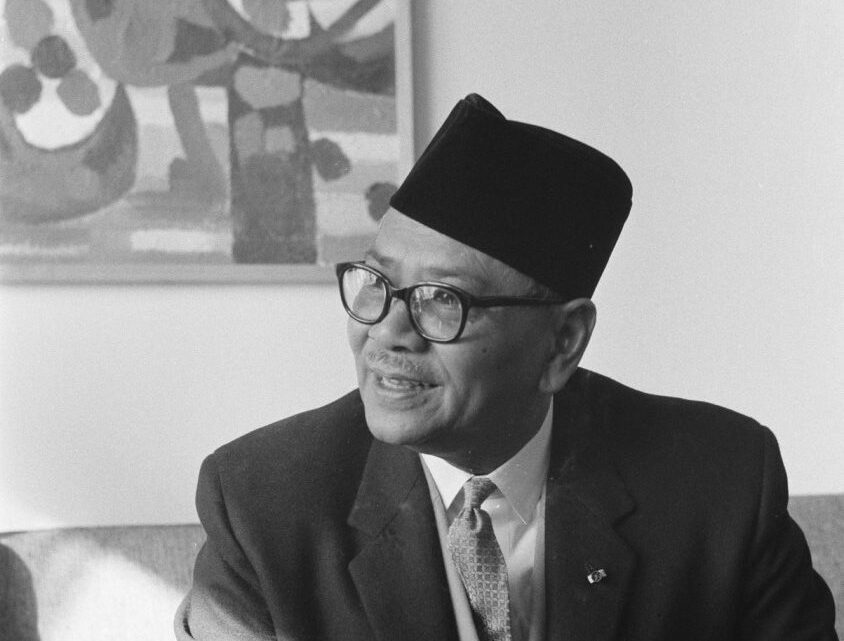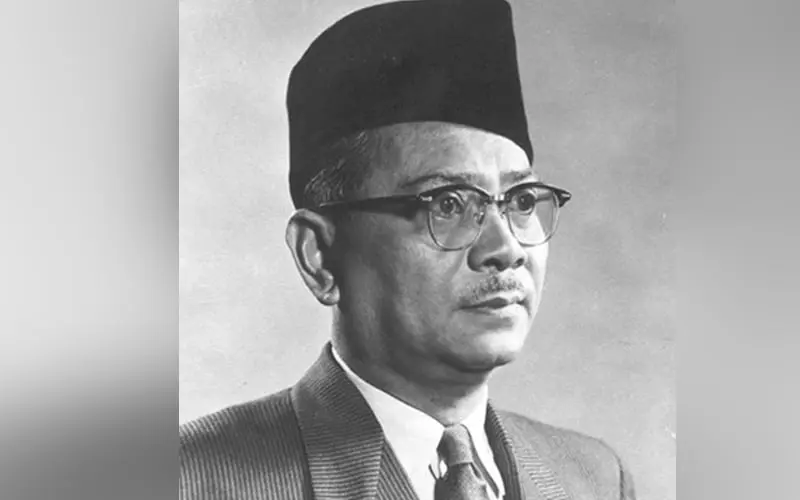
Tunku Abdul Rahman Putra al-Haj Bio: Age, Net Worth, Wife, Children, Cause of Death, Family
0 Posted By Kaptain KushBiography
Tunku Abdul Rahman Putra Al-Haj (1903–1990) was Malaysia’s founding father and first Prime Minister, serving from 1957 to 1970.
Revered as the “Father of Independence,” he played a pivotal role in leading Malaya to freedom from British colonial rule in 1957 and later spearheaded the creation of Malaysia in 1963, uniting Malaya, Sabah, Sarawak, and initially Singapore.
Trending Now!!:
- Meet ZEROBASEONE Members: Exploring the Ages of the Boy Band
- Thomas Girardi Bio: Net Worth, Age, Wife, Sentence, Parents, Children, Height, Jail
- Meet Zari Hassan’s Children: Latifah Dangote, Pinto, Dido, and George Semwanga
- Chekas – BBNaija Biography: Age, Net Worth, Real Names, Parents, State Of Origin, Videos
- Meet Drew Scott’s Parents: Jim Scott and Joanne Scott
A prince of the Kedah royal family and trained lawyer, Tunku Abdul Rahman was known for his charisma, humility, and unwavering commitment to national unity. As a key figure in forming the United Malays National Organisation (UMNO), he championed moderate governance, multicultural harmony, and steady economic growth during the nation’s formative years.
He stepped down in 1970, leaving behind a legacy marked by peaceful diplomacy, inclusive leadership, and the foundation of a modern Malaysian state.
| Former Prime Minister of Malaysia | |
| Tunku | |
|---|---|
 | |
| Wiki Facts & About Data | |
| Real Name: | Tunku Abdul Rahman Putra Al-Haj |
| Stage Name: | Tunku |
| Born: | 8 February 1903 (age 87 years old) |
| Place of Birth: | Alor Setar, Malaysia |
| Died: | 6 December 1990 (age 87 years), Federal Territory of Kuala Lumpur, Malaysia |
| Nationality: | Malaysian |
| Education: | Malay Primary School, Sultan Abdul Hamid College, Debsirin School, St Catharine’s College, Cambridge University |
| Height: | 1.67 m |
| Parents: | Sultan Abdul Hamid Halim Shah, Che Manjalara |
| Siblings: | Tunku Ibrahim, Tunku Yaacob, Badlishah of Kedah, Tunku Ya’akob Ibni Almarhum Sultan Abdul Hamid Halim Shah, Tunku Muhammad Saad Ibni Almarhum Sultan Abdul Hamid Halim Shah, Tunku Fatimah Binti Almarhum Sultan Abdul Hamid Halim Shah, Tunku Abdullah Thani Ibni Almarhum Sultan Abdul Hamid Halim Shah, Tunku Ibrahim Ibni Almarhum Sultan Abdul Hamid Halim Shah, Tunku Jahara Binti Almarhum Sultan Abdul Hamid Halim Shah, Tunku Yusuf, Tunku Zaleha Binti Almarhum Sultan Abdul Hamid Halim Shah, Tunku Zahara Binti Almarhum Sultan Abdul Hamid Halim Shah, Tunku Dakiah Binti Almarhum Sultan Abdul Hamid Halim Shah, Tunku Pengiran Ibni Almarhum Sultan Abdul Hamid Halim Shah, Tunku Shuib Ibni Almarhum Sultan Abdul Hamid Halim Shah, Tunku Noor Binti Almarhum Sultan Abdul Hamid Halim Shah, Tunku Baharum Binti Almarhum Sultan Abdul Hamid Halim Shah, Tunku Muhammad Akil Ibni Almarhum Sultan Abdul Hamid Halim Shah, Tunku Dakibh Ibni Almarhum Sultan Abdul Hamid Halim Shah, Tunku Zamzam Binti Almarhum Sultan Abdul Hamid Halim Shah, Tunku Abdul Majid Ibni Almarhum Sultan Abdul Hamid Halim Shah, Tunku Putri Binti Almarhum Sultan Abdul Hamid Halim Shah, Tunku Mohamed Jewa, Tunku Muhammad Ibni Almarhum Sultan Abdul Hamid Halim Shah D.Y.T.M. Raja Muda Kedah, Tunku Yahaya Ibni Almarhum Sultan Abdul Hamid Halim Shah, Tunku Kalsom Binti Almarhum Sultan Abdul Hamid Halim Shah, Tunku Ahmad Tajuddin Ibni Almarhum Sultan Abdul Hamid Halim Shah, Tunku Zainal Abidin Ibni Almarhum Sultan Abdul Hamid Halim Shah, Tunku Balkis Binti Almarhum Sultan Abdul Hamid Halim Shah, Tunku Zainal Rashid Ibni Almarhum Sultan Abdul Hamid Halim Shah, Tunku Jaafar Shah Ibni Almarhum Sultan Abdul Hamid Halim Shah, Tunku Sahara Binti Almarhum Sultan Abdul Hamid Halim Shah, Tunku Hindon Binti Almarhum Sultan Abdul Hamid Halim Shah, Tunku Aminah Binti Almarhum Sultan Abdul Hamid Halim Shah, Tunku Abdul Jalil Ibni Almarhum Sultan Abdul Hamid Halim Shah, Tunku Kassim Ibni Almarhum Sultan Abdul Hamid Halim Shah, Tunku Mansor Ibni Almarhum Sultan Abdul Hamid Halim Shah, Tunku Abdullah Ibni Almarhum Sultan Abdul Hamid Halim Shah, Tunku Habsah Binti Almarhum Sultan Abdul Hamid Halim Shah, Tunku Sofiah Binti Almarhum Sultan Abdul Hamid Halim Shah, Tunku Rokiah Binti Almarhum Sultan Abdul Hamid Halim Shah, Tunku Hajar Binti Almarhum Sultan Abdul Hamid Halim Shah |
| Spouse: | Bibi Chong (m. 1963–1990), Sharifah Rodziah Barakbah (m. 1939–1990), Violet Coulson (m. 1935), Lady Meriam (m. 1933–1935) |
| Girlfriend • Partner: | Not Dating |
| Children: | Tunku Khadijah, Tunku Ahmad Nerang, Tunku Noor Hayati, Tunku Mastura, Tunku Faridah, Suleiman Tunku Abdul Rahman, Tunku Mariam |
| Occupation: | Statesman • Politician |
| Net Worth: | $?? (USD) |
Early Life & Education
Tunku Abdul Rahman Putra Al-Haj was born on February 8, 1903, in Alor Setar, Kedah, then part of British Malaya. He was also a devout Sunni Muslim of Malay royal lineage from the Kedah Sultanate and Siamese heritage through his mother, and his faith deeply influenced his values and leadership style.
He was the son of Sultan Abdul Hamid Halim Shah, the 26th Sultan of Kedah, and Che Manjalara, a Siamese princess. Tunku was the seventh of nine children born to his mother and one of more than 40 siblings from his father’s several marriages, including notable figures like Tunku Ibrahim and Tunku Yaacob.
His early education began at a Malay Primary School in Alor Setar before he moved on to the Government English School, now known as Sultan Abdul Hamid College. At the age of 16, he spent two years studying at Debsirin School in Bangkok, influenced by his mother’s Siamese background.
In 1920, he was awarded a Kedah state scholarship to study at St Catharine’s College, Cambridge University, where he earned a bachelor’s degree in history in 1925. He later pursued legal studies at the Inner Temple in London, eventually qualifying as a barrister in 1949, after delays brought on by financial hardship and the outbreak of World War II.
Growing up in the Istana Pelamin palace, Tunku was steeped in the customs and traditions of the Kedah royal household. His upbringing, marked by blending Malay, Siamese, and British cultural influences, shaped his open-minded and cosmopolitan worldview.
Career
Tunku Abdul Rahman Putra Al-Haj’s career encompassed law, public service, and politics, ultimately leading him to become Malaysia’s first Prime Minister. After qualifying as a barrister at the Inner Temple in London in 1949, he returned to Malaya and joined the Kedah civil service, where he served as a district officer in places like Kulim and Sungai Petani.
Known for his approachable nature and dedication to rural communities, he gained respect among the local population, although his royal background occasionally set him apart from the more rigid structures of the colonial bureaucracy.
His political engagement deepened in the 1940s as he observed British colonial governance and the rise of Malay nationalism. In 1945, he co-founded the United Malays National Organisation (UMNO) and became its president in 1951. Under his leadership, UMNO advocated for Malay interests while promoting cooperation among Malaya’s multiethnic communities—a principle that would come to define his political legacy.
He played a key role in forming the Alliance Party, a coalition of UMNO, the Malayan Chinese Association (MCA), and the Malayan Indian Congress (MIC), which led negotiations for independence from Britain. Following the Alliance’s overwhelming victory in the 1955 general election, Tunku was appointed Chief Minister of Malaya.
On August 31, 1957, Tunku declared Malaya’s independence and assumed office as the nation’s first Prime Minister. His administration prioritized nation-building, economic progress, and interethnic harmony. He was a central figure in the creation of Malaysia in 1963, uniting Malaya with Singapore, Sabah, and Sarawak—though Singapore’s exit from the federation in 1965 marked a significant challenge.
Tunku’s government emphasized rural development, education, and infrastructure, yet growing economic and ethnic tensions persisted. These tensions came to a head in the form of the 1969 race riots, a crisis that drew criticism of his leadership and ultimately led to his resignation in 1970.
Following his time in office, Tunku contributed internationally, serving as Secretary-General of the Organisation of Islamic Cooperation (1970–1973), where he promoted solidarity among Muslim nations.
He later became a columnist for The Star, offering thoughtful commentary on Malaysian politics and society. Until his death in 1990, Tunku remained a respected elder statesman and a symbolic figure of Malaysia’s independence and unity.
Personal Life
Tunku Abdul Rahman Putra Al-Haj was born on February 8, 1903, and died on December 6, 1990, at the age of 87.
He had four marriages. His first wife was Meriam Chong, a Chinese woman he married in 1933. Meriam converted to Islam, taking the name Mariam, but died in 1935 from malaria, shortly after giving birth to their second child.
Tunku then married Violet Coulson, an Englishwoman, in 1939; they divorced amicably in 1946 due to cultural differences and had no children. In 1948, he married Sharifah Rodziah Syed Alwi Barakbah, who remained his wife until his death. Sharifah Rodziah, a Malay, was a supportive partner and served as Malaysia’s first First Lady during his political career.
Tunku had two children with Meriam Chong: Tunku Khadijah and Tunku Ahmad Nerang, both adopted by Sharifah Rodziah after their marriage. He had no children from his second or third marriages.
No specific records of Tunku’s height exist, but photographs suggest he was of average stature for a Malay man of his era, likely around 5 feet 6 inches to 5 feet 8 inches.
Tunku Abdul Rahman died on December 6, 1990, in Kuala Lumpur, Malaysia, from natural causes related to old age, with reports citing kidney failure as a contributing factor. His health had declined in his later years, but he remained active in writing and public life until shortly before his death.
Net Worth
Tunku Abdul Rahman Putra Al-Haj’s net worth is not definitively recorded, as detailed financial accounts from his time are scarce. Born into the royal family of Kedah in 1903, he had the advantages of noble birth, but his early life—especially during his education in England—was marked by financial challenges.
As Malaysia’s first Prime Minister from 1957 to 1970, he earned a standard government salary and was known for his modest, unpretentious lifestyle. Though he later served as Secretary-General of the Organisation of Islamic Cooperation and wrote newspaper columns, these roles were more rooted in service than financial gain.
At the time of his death in 1990, Tunku’s wealth was likely modest, reflecting a life devoted to nation-building rather than personal enrichment.
NOTICE!! NOTICE!! NOTICE!!
DISCLAIMER!! : Every Biography and Content Published On TheCityCeleb are For Knowledge Reason. Don't Hesitate to Reach Out for Any Correction || Suggestion || Copyright!!CORRECT@thecityceleb.com

